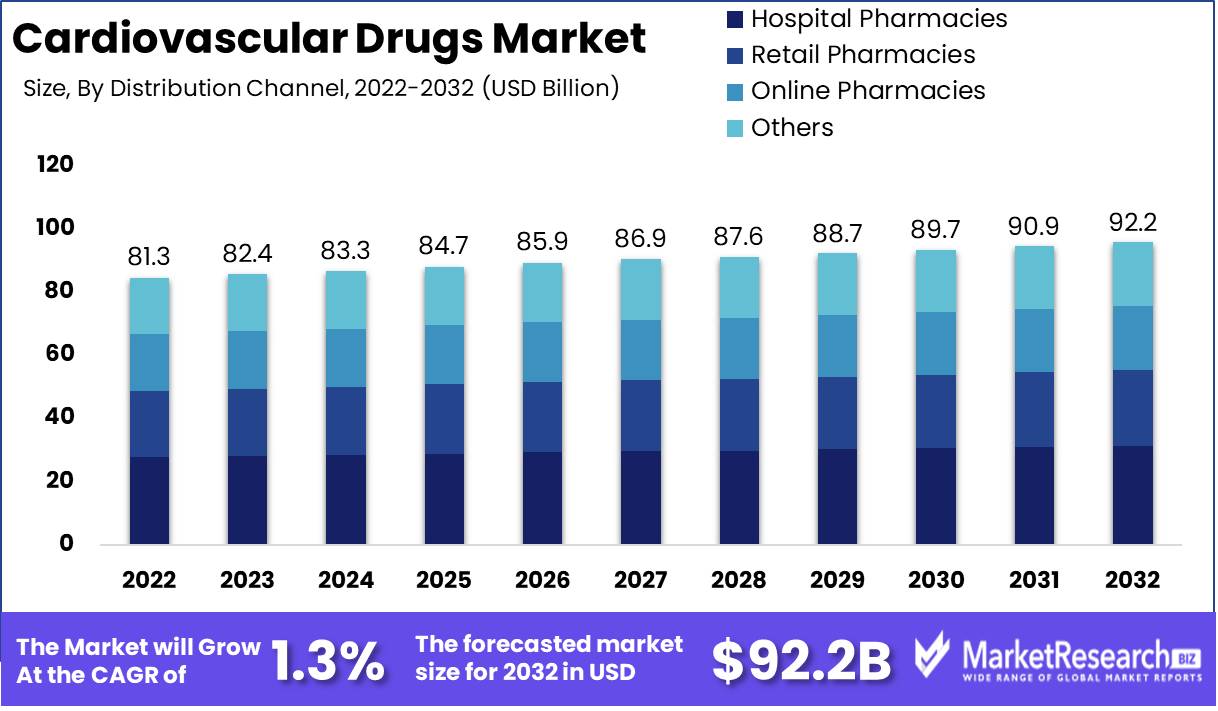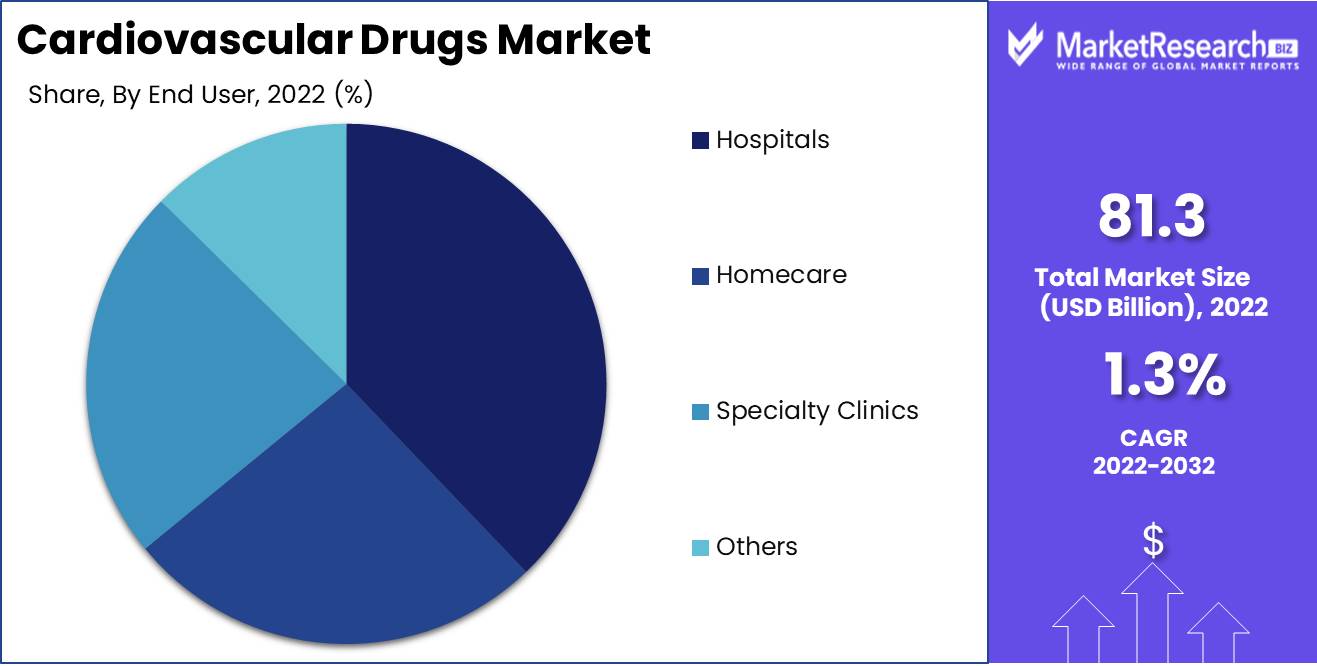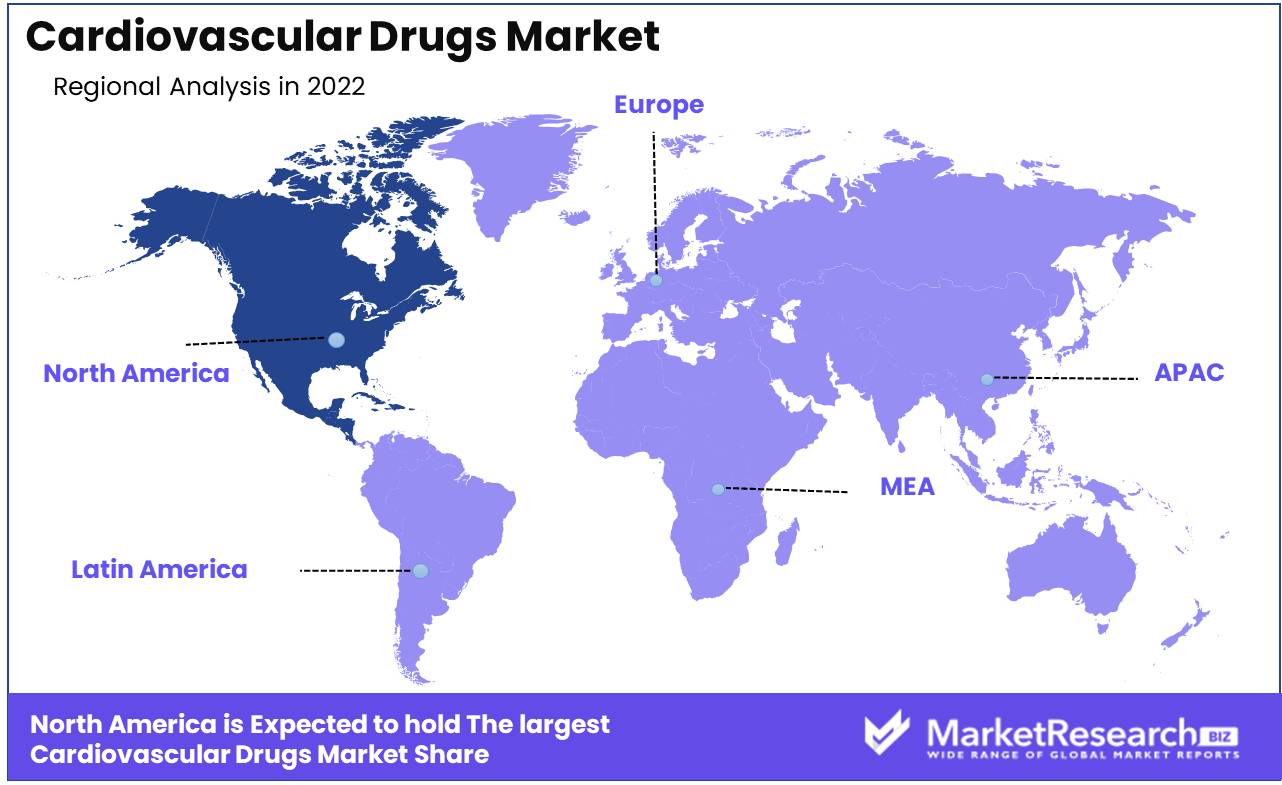
Cardiovascular Drugs Market Drug Class Analysis (Anti-hypertensive, Anti-hyperlipidemics, and Others ), Distribution Channel Analysis (Hospital Pharmacies, Retail Pharmacies, and Others), By Region And Companies - Industry Segment Outlook, Market Assessment, Competition Scenario, Trends, And Forecast 2023-2032
-
22873
-
May 2023
-
190
-
-
This report was compiled by Trishita Deb Trishita Deb is an experienced market research and consulting professional with over 7 years of expertise across healthcare, consumer goods, and materials, contributing to over 400 healthcare-related reports. Correspondence Team Lead- Healthcare Linkedin | Detailed Market research Methodology Our methodology involves a mix of primary research, including interviews with leading mental health experts, and secondary research from reputable medical journals and databases. View Detailed Methodology Page
-
Quick Navigation
Report Overview
Cardiovascular Drugs Market size is expected to be worth around USD 92.2 Bn by 2032 from USD 81.3 Bn in 2022, growing at a CAGR of 1.3% during the forecast period from 2023 to 2032.
The cardiovascular drugs market encompasses a wide range of pharmacological treatments for a variety of cardiovascular disorders, including but not limited to angina, heart failure, and arrhythmias. These pharmacotherapeutic agents regulate cardiac rhythm, reduce the risk of heart attacks and strokes, and control hypertension. In recent years, this market's landscape has been transformed by the introduction of novel drug formulations and cutting-edge technologies designed to combat cardiovascular diseases.

In order to discover novel drugs and treatment modalities, pharmaceutical companies devote substantial resources to research and development endeavors, as innovation is a top priority in the cardiovascular drugs market. The introduction of ACE inhibitors, beta-blockers, and calcium channel blockers, which have unquestionably revolutionized the treatment of hypertension and cardiac disorders, are among the most notable advances in this field. Recent years have witnessed an escalating emphasis on personalized medicine, a revolutionary approach that involves tailoring treatment plans based on patient's genetic profiles.
The cardiovascular drugs market is poised for remarkable growth in the future years due to an aging population, an increase in the prevalence of cardiovascular pathologies, and an escalating demand for personalized medical interventions. In addition, the convergence of technological advances, including remote monitoring devices and artificial intelligence, has the potential to improve patient outcomes and reduce healthcare costs. Pharmaceuticals, biotechnology, and medical device production are just a few of the industries with stakeholders in the cardiovascular drugs market.
The escalating prevalence of cardiovascular diseases, the ever-increasing awareness of heart health, and the rise in healthcare expenditures are some of the primary forces propelling the cardiovascular drug market. In addition, technological advancements, an aging population, and favorable government policies all contribute to the market's growth trajectory. Concurrently, the escalating demand for personalized medicine, which exemplifies treatment customization based on individual genetic profiles, has emerged as a major force influencing market dynamics.
Concerns on the ethical front that pervade the cardiovascular drugs market include transparency, explainability, and accountability, among others. It is of the utmost importance to ensure the safety and efficacy of drugs and treatments, as well as to raise patients' awareness of all available treatment options. Responsible practices in this field involve adhering to ethical standards during the development and testing phases of drugs, as well as ensuring that patients receive adequate care and assistance.
Driving factors
Expansion of the Cardiovascular Drug Market
The cardiovascular drugs market is anticipated to expand considerably over the next few years, primarily due to a number of factors, such as the rising prevalence of cardiovascular diseases. Cardiovascular diseases are becoming more prevalent on a global scale as a result of altering lifestyles, poor diets, and a lack of physical activity. The increasing geriatric population also contributes significantly to the growth of the cardiovascular drugs market, as the elderly are more susceptible to developing cardiovascular diseases.
Technological Developments Improve Cardiological Drugs
Increasing the effectiveness of cardiovascular drugs has been significantly aided by technological advancements in drug development. Understanding cardiovascular diseases better has led to the development of improved drugs that can target specific disease mechanisms, thereby increasing the effectiveness and safety of the medication. Improving healthcare infrastructure in developing economies, coupled with rising healthcare expenditures, is increasing access to cardiovascular drugs.
Cardiovascular Market Driven by Personalized Drugs
The increasing demand for personalized medicine has also been a significant driver of the cardiovascular drugs market. Favorable reimbursement policies and the rising adoption of combination therapies are bolstering market growth. In addition, there has been a significant focus on research and development in the cardiovascular drugs industry.
Regulatory Alterations Influence Cardio Drug Market
The cardiovascular drugs market may be impacted by regulatory changes. Regulatory agencies are placing a greater emphasis on safety and efficacy standards, resulting in more stringent regulations for drug developers. Several emerging technologies, such as gene therapies, which have shown promise in treating cardiovascular diseases, may have an impact on the cardiovascular drug market.
Emerging Trends Transform Cardio Drugs
The entry of new market participants, resulting in a price war, and the rising demand for generic drugs are potential factors that could impact the competitive landscape of the cardiovascular drugs market. In addition, emerging trends and changes in consumer behavior, such as an increased awareness of a healthful lifestyle, could have a positive impact on the market.
Restraining Factors
Restriction Impacts on Cardiovascular Drugs
Longstanding influences on the cardiovascular drugs market include stringent regulatory policies, high costs associated with drug development, side effects associated with cardiovascular drugs, increasing availability of alternative therapies, patent expiration, and generic competition. The impact of these factors has grown significantly in recent years, leading to modifications in how companies develop, market, and distribute cardiovascular drugs.
Stricter Requirements Hinder Cardio Market
One of the primary factors restraining the cardiovascular drugs market is stringent regulatory policies. The cardiovascular drug regulatory policies are stringent because adverse effects of these drugs can have severe consequences. Before being approved, cardiac drugs must undergo extensive clinical trials to demonstrate their efficacy, safety, and quality. This rigorous approval procedure is time-consuming and costly.
High Costs Have an Impact on Drug Development.
Several billion dollars are spent on the development of novel drugs. Research and development, clinical trials, patent fees, and marketing contribute to the high costs. It is not always possible for pharmaceutical companies to produce new drugs at lower costs, despite mounting pressure to do so. This has resulted in higher prices for drugs, making it difficult for consumers to afford them.
Side Effects Influence Cardio Sales
Some adverse side effects of cardiovascular drugs are mild and readily manageable, while others can be severe and life-threatening. The side effects have a significant impact on the sales and utilization of these drugs. Before prescribing the drugs, healthcare professionals must weigh the benefits against the side effects. In addition, patients' awareness of side effects has increased, and they prefer alternative therapies.
Alternative Therapies Alter Market
The availability of alternative therapies has had a significant impact on the cardiovascular drugs market. The market for alternative therapies has expanded as patients' awareness of them has increased. In addition, these therapies lack the severe side effects associated with cardiovascular drugs, making them preferable. Alternative therapies, such as lifestyle modifications, herbal remedies, and complementary therapies, are gaining popularity.
Drug Class Analysis
The Anti - Hypertensive Drugs Analysis Segment has dominated the cardiovascular drugs market. These drugs are used to reduce blood pressure and the risk of heart attack, stroke, and heart failure. This segment's growth has been fueled by the rising prevalence of hypertension and an increase in healthcare spending.
Anti-hypertensive drugs Analysis Segment adoption has been primarily driven by economic growth in emerging economies. As these economies continue to expand, urbanization and lifestyle modifications have led to an increase in hypertension cases. This has resulted in a rise in the demand for hypertensive drugs.
Anti - hypertensive drugs: consumer trends and behavior Analysis Segment have also played a significant role in driving this segment's growth. Consumers are becoming more conscious of their blood pressure levels as awareness of hypertension and its negative effects on health grows. As a consequence, they are seeking medical attention and controlling their blood pressure with anti-hypertensive drugs.
Due to a number of factors, it is anticipated that the Anti - Hypertensive drugs Analysis Segment will register the quickest growth rate over the coming years. These include the increasing prevalence of hypertension, the rising cost of healthcare, and the expanding awareness among consumers. In addition, the development of new drugs with greater efficacy and fewer adverse effects are anticipated to contribute to the growth of this market segment.
Distribution Channel Analysis
The Hospital pharmacies Segment Dominates the Cardiovascular Drugs Market. As hospitals are the primary healthcare providers for cardiovascular-related ailments, hospital pharmacies distribute the majority of drugs.
The economic growth of emerging economies has also played a significant role in driving the expansion of the Hospital pharmacies Segment. As a result of the rise in medical tourism, hospitals in emerging economies are expanding, and the demand for cardiovascular drugs has also increased.
The trend and behavior of consumers toward the Hospital pharmacies Segment has been driven by the accessibility and convenience of these pharmacies. Patients favor hospital pharmacies because they are assured of the quality and efficacy of the drugs.
Due to a number of factors, it is anticipated that the Hospital pharmacies segment will register the highest growth rate in the future years. These include the increase in demand for cardiovascular drugs, the rise in healthcare expenditures, and the expansion of hospital networks in emerging economies.
End User Analysis
The Hospitals Segment dominates the cardiovascular drugs market. Hospitals are the primary healthcare providers for cardiovascular-related illnesses; consequently, hospitals prescribe and dispense the majority of drugs.
The economic growth in emerging economies has also played an important role in driving the expansion of the Hospitals Segment. The expansion of hospitals as a consequence of the increase in medical tourism has led to a rise in the number of hospitals and beds.
The trend and behavior of consumers toward the Hospitals Segment have been driven by the accessibility and quality of healthcare services hospitals provide. Customers favor hospitals because they can receive specialized cardiovascular care and treatments.
Due to a number of factors, the hospital's Segment is anticipated to register the highest growth rate in the coming years. These include the increasing demand for specialized healthcare services, the increase in healthcare expenditures, and the expansion of hospital networks in emerging economies.

Key Market Segments
Drug Class Analysis
- Anti-hypertensive
- Anti-hyperlipidemics
- Anti-coagulants
- Anti-fibrinolytics
- Anti-arrhythmic
Distribution Channel Analysis
- Hospital Pharmacies
- Retail Pharmacies
- Online Pharmacies
- Others
End User Analysis
- Hospitals
- Homecare
- Specialty Clinics
- Others
Growth Opportunity
Increasing Demand for Cardiovascular Medication
The demand for innovative drugs and personalized treatments is increasing as the prevalence of cardiovascular diseases continues to rise globally. Several factors, including the rising demand for combination therapies, the increasing adoption of biologic drugs, the focus on personalized medicine, the rising importance of early diagnosis and treatment, and the rising demand for cardiovascular drugs in emerging markets, are anticipated to fuel the cardiovascular drugs market's substantial growth.
Combination Therapies on the Rise
In the treatment of cardiovascular diseases, the combination of drugs with distinct mechanisms of action has proven to be effective. Combination therapies offer a number of benefits, including synergistic benefits, enhanced efficacy, and decreased adverse effects. In response to this demand and the effectiveness of combination therapy, combination drugs are flooding the market.
Biologics Transform Treatment
Biologic drugs or biologics are a category of pharmaceuticals derived from living organisms or their compounds. Improved efficacy and safety profiles have revolutionized the treatment of cardiovascular diseases. Biologics are especially effective in the treatment of complex and chronic diseases, including heart failure, arrhythmia, and atherosclerosis, among others. With the increasing use of biologics, the cardiovascular drugs market is anticipated to expand.
Personalized Medicine in Cardiovascular Care
The focus on personalized medicine is increasing, largely as a result of advancements in genomics, proteomics, and other omics sciences. The goal of personalized medicine is to provide customized treatment strategies based on the genetic and biomarker profile of each individual patient. In the treatment of cardiovascular diseases, personalized medicine has demonstrated enormous potential, with early diagnosis and targeted treatments offering enhanced outcomes and reduced adverse effects.
Innovations in Early Diagnosis
Diagnosis and treatment of cardiovascular diseases at an early stage can substantially improve patient outcomes and reduce the financial burden on healthcare systems. Utilizing biomarkers and imaging techniques for early diagnosis is acquiring traction, and significant market investments are being made in this area. The development of non-invasive monitoring and diagnostic instruments is a crucial area of focus, as they offer improved patient outcomes and lower healthcare costs.
Latest Trends
The Cardiovascular Drugs Market is Driven by Combination Therapies
Several main market trends are causing significant changes in the cardiovascular drugs market. It is essential to comprehend how these trends will impact the market in the coming years, as they are reshaping the industry's future.
Precision Medicine Revolutionizes Cardiovascular Treatment
The growing use of combination therapies for the treatment of cardiovascular diseases is one of the market's most influential trends. Combination therapies utilize two or more drugs to address a disease. Due to the ability of combination therapies to increase the efficacy of treatments while decreasing the risk of adverse side effects, this strategy is gaining popularity.
Novel Drug Delivery Systems Change Cardiovascular Drugs
Precision medicine, which involves the use of individualized treatment regimens based on a patient's genetic makeup, is another significant trend driving the market for cardiovascular drugs. With a growing understanding of the role of genetics in cardiovascular disease, precision medicine is gaining importance as a tool for the prevention and treatment of these conditions.
Patient-Focused Care Transforms the Cardiovascular Industry
Another trend that is propelling the cardiovascular drug market is the development of novel drug delivery systems. These systems are intended to enhance the delivery of drugs to the intended site and reduce the risk of adverse side effects. Additionally, novel drug delivery systems can improve patient adherence and enhance the efficacy of treatments.
Regenerative Medicine Revolutionizes Cardiovascular Treatment
Patient-centered care is gaining importance in the healthcare industry, and this trend is influencing the market for cardiovascular drugs. Patient-centered care involves putting the patient at the center of treatment and adopting a holistic perspective. This strategy emphasizes patient education, communication, and participation in the decision-making process.
Regional Analysis
Due to rising cardiovascular disease and aging populations, the North American market is dominant. Our results imply that lifestyle modifications, medical breakthroughs, and preventative care can improve heart health in the region.
The aging North American population contributes to cardiovascular disease. High blood pressure, cholesterol, and diabetes raise heart disease risk as people age. Heart disease is expected to rise across North America. Preventative care for heart disease in the elderly is being prioritized.
Increased unhealthy lifestyles are another factor. Smoking, poor diets, and inactivity increase heart disease risk. People are making unhealthy choices due to convenience food and screen time.
North American healthcare systems are using lifestyle changes and advanced medical technologies in preventative care to address this tendency. To lower heart disease risk, patients receive food and nutrition advice, stress management, and smoking cessation.
Robotic heart surgery, implantable cardioverter-defibrillators, and artificial hearts are other heart health technologies. Medical technology allows doctors to provide patients with minimally invasive heart operations and remote monitoring.

Key Regions and Countries
North America
- US
- Canada
- Mexico
Western Europe
- Germany
- France
- The UK
- Spain
- Italy
- Portugal
- Ireland
- Austria
- Switzerland
- Benelux
- Nordic
- Rest of Western Europe
Eastern Europe
- Russia
- Poland
- The Czech Republic
- Greece
- Rest of Eastern Europe
APAC
- China
- Japan
- South Korea
- India
- Australia & New Zealand
- Indonesia
- Malaysia
- Philippines
- Singapore
- Thailand
- Vietnam
- Rest of APAC
Latin America
- Brazil
- Colombia
- Chile
- Argentina
- Costa Rica
- Rest of Latin America
Middle East & Africa
- Algeria
- Egypt
- Israel
- Kuwait
- Nigeria
- Saudi Arabia
- South Africa
- Turkey
- United Arab Emirates
- Rest of MEA
Key Players Analysis
The global cardiovascular drugs market is anticipated to expand consistently over the coming years due to rising demand for safe and effective treatments for cardiovascular disorders. AstraZeneca, Pfizer, Sanofi, Novartis, Daiichi Sankyo, and Bristol-Myers Squibb are key participants in this market.
AstraZeneca is a leader in the development of cardiovascular drugs, including Brilinta, which reduces the risk of heart attack and stroke in patients with acute coronary syndrome. Pfizer is an additional major player in the cardiovascular market, with drugs such as Lipitor, which is used to treat high cholesterol. Sanofi is also an established player, with important drugs such as Lantus, which is used to treat diabetes and reduce patients' risk of heart disease.
Novartis is also a major player in the treatment of hypertension and heart failure with drugs such as Diovan and Entresto. Daiichi Sankyo is an additional significant player in the cardiovascular market, with key drugs like Efficient, which is used to reduce the risk of blood clots in patients with acute coronary syndrome. Bristol-Myers Squibb is also a major player, with drugs like Plavix, which reduces the risk of heart attack and stroke in patients with cardiovascular disease.
Top Key Players in Cardiovascular Drugs Market
- Bristol-Myers Squibb Company
- Pfizer Inc.
- Bayer AG
- Janssen Pharmaceuticals, Inc.
- AstraZeneca
- Sanofi
- Novartis AG
- Merck & Co., Inc.
- Gilead Sciences, Inc.
- Hoffmann-La Roche Ltd
- Other Players
Recent Development
- In 2023, The development of mRNA-based therapies for cardiovascular diseases, the achievement of mRNA-based COVID-19 vaccines, and cardiovascular medicine.
- In 2022, Omecamtiv mecarbil, a selective cardiac myosin activator, received FDA approval 2021 and went on sale.
- In 2021, The Development of Sotagliflozin will be a dual sodium-glucose cotransporter 1 (SGLT1) and SGLT2 inhibitor.
- In 2020, Inclisiran, a novel drug belonging to the class of PCSK9 inhibitors, received approval and became commercially available. This occurred in late 2019; the drug gained approval in 2020.
- In 2019, Entresto, a combination drug containing sacubitril and valsartan, gained significant traction after receiving approval in 2015.
Report Scope:
Report Features Description Market Value (2022) USD 81.3 Bn Forecast Revenue (2032) USD 92.2 Bn CAGR (2023-2032) 1.3% Base Year for Estimation 2022 Historic Period 2016-2022 Forecast Period 2023-2032 Report Coverage Revenue Forecast, Market Dynamics, COVID-19 Impact, Competitive Landscape, Recent Developments Segments Covered Drug Class Analysis (Anti-hypertensive, Anti-hyperlipidemics, Anti-coagulants, Antifibrinolytics, Anti-arrhythmic), Distribution Channel Analysis (Hospital Pharmacies, Retail Pharmacies, Online Pharmacies, Others), End User Analysis (Hospitals, Homecare, Specialty Clinics, Others) Regional Analysis North America – The US, Canada, & Mexico; Western Europe – Germany, France, The UK, Spain, Italy, Portugal, Ireland, Austria, Switzerland, Benelux, Nordic, & Rest of Western Europe; Eastern Europe – Russia, Poland, The Czech Republic, Greece, & Rest of Eastern Europe; APAC – China, Japan, South Korea, India, Australia & New Zealand, Indonesia, Malaysia, Philippines, Singapore, Thailand, Vietnam, & Rest of APAC; Latin America – Brazil, Colombia, Chile, Argentina, Costa Rica, & Rest of Latin America; Middle East & Africa – Algeria, Egypt, Israel, Kuwait, Nigeria, Saudi Arabia, South Africa, Turkey, United Arab Emirates, & Rest of MEA Competitive Landscape Bristol-Myers Squibb Company, Pfizer Inc., Bayer AG, Janssen Pharmaceuticals, Inc., AstraZeneca, Sanofi, Novartis AG, Merck & Co., Inc., Gilead Sciences, Inc., Hoffmann-La Roche Ltd, Other Players Customization Scope Customization for segments, region/country-level will be provided. Moreover, additional customization can be done based on the requirements. Purchase Options We have three licenses to opt for: Single User License, Multi-User License (Up to 5 Users), Corporate Use License (Unlimited User and Printable PDF) -
-
- Bristol-Myers Squibb Company
- Pfizer Inc.
- Bayer AG
- Janssen Pharmaceuticals, Inc.
- AstraZeneca
- Sanofi
- Novartis AG
- Merck & Co., Inc.
- Gilead Sciences, Inc.
- Hoffmann-La Roche Ltd
- Other Players




